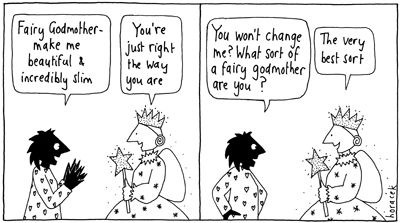Artist Linda Stein breaks it down in this video. 

In an article for the most recent On the Issues Magazine (here), Stein writes:
Created by William Moulten Marston in 1941, Wonder Woman was the”invincible enemy of injustice.”She was my role model as a kid, the only female superhero of the day, arriving a bit before I was born. I felt empowered by her strength and courage and inspired to be kind to my friends.
Marston, writing under the pseudonym of Charles Moulton, said”there isn’t enough love in the male organism to run the planet peacefully. What women presently lack is the dominance or self assertive power to put over and enforce her love desires. I have given (Wonder Woman) the dominant force but have kept her loving.”* * *
Each episode begins with one telling text:”Righting wrongs, defending America from the enemies of democracy and fighting fearlessly for downtrodden women and children, in a man-made world, Wonder Woman wins all hearts and leads the youth of America to victory over evil.”
With Marston’s advocacy for strong, independent women, Wonder Woman begins to change the doctrine that”male”means aggression and”female”means submission. Wonder Woman symbolizes many of the values that feminists hold dear today: strength, self-reliance, mutual support, peace, respect for human life and a trust in soft power rather than violence and aggression to solve the world’s conflicts.
With his bold, feminist approach (for 1941, that is), Marston hoped to counter the violence of the”blood-curdling masculinity”that pervaded the comics of the day. His stories expressed his belief that individuals free of gender stereotypes are also free to develop to their full potential. He held to his goal of allowing Wonder Woman to use force, but only as a defender of justice, and most importantly, without killing.
At her best, Wonder Woman was fabulous — but not perfect. The original comics reflected a good deal of the jingoism, sexism, racism and homophobia of the 1940s. There was much about her that I had to dismiss and ignore, and felt, even as a kid, was very wrong. Unfortunately, these phobic tendencies worsened after Marston died in 1947, and Wonder Woman became much more of a bullet-breasted sex object, especially in the TV version with Lynda Carter.
And yet, as far as being a superhero role model for women’s freedom, I still believe she’s the best.
I was raised on the Lynda Carter version myself, so I’m less critical of the jiggle-wiggle star-spangled bathing suit (and it’s not like the 1940’s version was so well-covered, either). There was some subversive power in those astral briefs and eagle bustier. And the golden lasso and clear plane in Lynda Carter’s hands were cool beyond belief. Nevertheless, I appreciate Stein’s emphasis on Wonder Woman’s “strength, self-reliance, mutual support, peace, respect for human life and a trust in soft power rather than violence and aggression to solve the world’s conflicts.”
Wonder Woman as feminist role model? Maybe not. But Wonder Woman as feminist icon? Absolutely.
-Bridget Crawford


 Feminist Law Prof Michael J. Higdon (Tennessee) has posted to SSRN his working paper, “To Lynch a Child: Bullying and Gender Non-Conformity in Our Nation’s Schools.” Here is the abstract:
Feminist Law Prof Michael J. Higdon (Tennessee) has posted to SSRN his working paper, “To Lynch a Child: Bullying and Gender Non-Conformity in Our Nation’s Schools.” Here is the abstract:

 Leslie Yalof Garfield (Pace) previously blogged
Leslie Yalof Garfield (Pace) previously blogged 



 Feminist Law Prof Kim Krawiec (Duke) has posted to SSRN a draft of her working paper, “A Woman’s Worth.” Here is the abstract:
Feminist Law Prof Kim Krawiec (Duke) has posted to SSRN a draft of her working paper, “A Woman’s Worth.” Here is the abstract:


 Feminist Law Prof
Feminist Law Prof 
